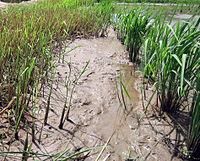
Photo from wikipedia
Breeding for water-deficit tolerance is fundamental to guarantee the sustainability of upland rice production, mainly due to the possibility of an increased frequency of drought episodes due to climate change.… Click to show full abstract
Breeding for water-deficit tolerance is fundamental to guarantee the sustainability of upland rice production, mainly due to the possibility of an increased frequency of drought episodes due to climate change. This work aimed to identify single nucleotide polymorphism (SNP) markers, derived from RNA sequencing (RNA-Seq), genome-wide association study (GWAS) and candidate genes from Arabidopsis, with potential for use in marker-assisted selection (MAS) for drought tolerance. RNA-Seq and GWAS were efficient in identifying useful SNP markers from the data obtained from three years of field experiments for 175 upland rice accessions, which were sequenced using 32 genes by Capture-Seq. Three genes were equally able to generate SNP markers that discriminated 95% of the 20 most drought susceptible accessions in the joint analysis of the experiments. The elimination of the genotypes with the unfavourable SNP allele reduced the initial number of accessions to one third, and transferring this result in a breeding routine, would enable to conduct smaller experiments per target location, increasing the precision and reducing the cost of the drought phenotyping.
Journal Title: Genetics and Molecular Research
Year Published: 2018
Link to full text (if available)
Share on Social Media: Sign Up to like & get
recommendations!